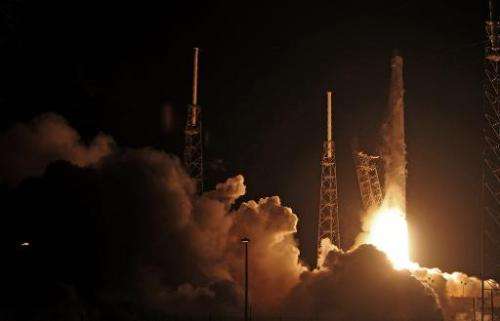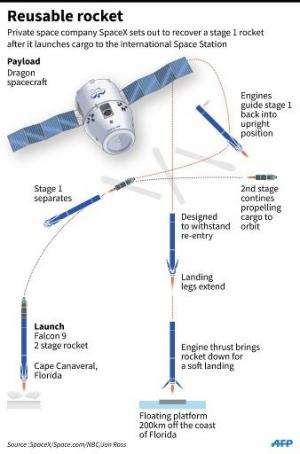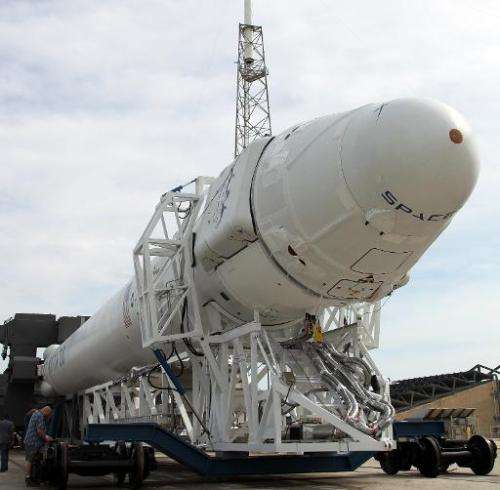Rocket glitch forces SpaceX to abort landmark launch (Update)

A last-minute glitch forced SpaceX to abort a landmark bid Tuesday to transform rocket science into a recyclable industry by landing the first stage of the Falcon 9 on an ocean platform.
The problem that led to the delay in the resupply mission to the International Space Station involved the rocket's second stage, which is the portion that lifts the cargo vessel to orbit after the first stage falls back to Earth.
"Need to investigate the upper stage Z actuator. Was behaving strangely," SpaceX CEO Elon Musk said on Twitter.
"Next launch attempt on Friday."
The California-based company headed by Musk, an Internet entrepreneur known for co-founding PayPal and running Tesla Motors, hopes to figure out the problem in time for a fresh chance Friday at 5:09 am (1009 GMT) to launch the rocket and its Dragon cargo ship to the ISS.
Minutes after blast off, when the unmanned cargo vessel is on its way to orbit, the experiment will begin. Instead of plummeting into the ocean, the rocket's first stage engines should refire three times, guiding the 14-story tall portion of the Falcon 9 to land upright on a floating platform in the Atlantic Ocean, some 200 miles (322 kilometers) off the coast of northern Florida.
Will it work?
"I have no idea," Musk admitted on Reddit late Monday, after initially giving the experiment a 50-50 chance of success.

Transform rocket science
As of now, rocket launches cost hundreds of millions of dollars or more, largely because the rockets are allowed to fall in pieces into the ocean after liftoff, becoming trash.
Musk wants to transform the industry by honing technology that would allow rockets to return to Earth intact for use again and again, much like the airline industry does with passenger planes.
The company has made two attempts at controlled ocean landings already, and this launch would mark the first bid to land the rocket on a platform in the ocean.
Eventually, the company hopes to make rockets that can return to a landing spot on solid ground.
"A fully and rapidly reusable rocket—which has never been done before—is the pivotal breakthrough needed to substantially reduce the cost of space access," said a SpaceX statement.
Mission: cargo
While the bid to recycle a rocket has garnered plenty of attention, SpaceX says the mission's primary goal is to bring a load of supplies and food to the six astronauts aboard the International Space Station.
The rocket launch will propel the Dragon cargo ship on its fifth official trip as part of a $1.6 billion contract with NASA to replenish equipment and gear at the orbiting outpost.

The launch was initially supposed to take place last month. But SpaceX postponed it on December 18 after a launchpad static test fire was a "tad short" and the team decided to exercise caution and postpone until the New Year, said Hans Koenigsmann, vice president for Mission Assurance at SpaceX.
The stakes are particularly high because Orbital Sciences, the only other US company capable of sending cargo to low-Earth orbit, suffered a catastrophic rocket failure in October, forcing an end to its supply missions until further notice.
After mission operators detected a problem with the Antares rocket engine moments after launch, the rocket was purposefully exploded, causing extensive damage to the Virginia launchpad and costing the company more than $200 million in lost equipment.
Orbital has said it will still be able to complete its contract with NASA by 2016, but no launches are scheduled for its Cygnus cargo carrier until the rocket problem can be fixed.
Orbital Sciences has a $1.9 billion contract with NASA to supply the space station.
© 2015 AFP




















